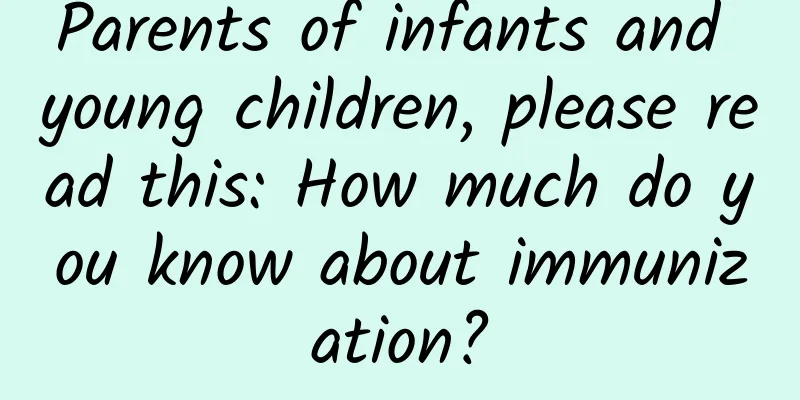Parents of infants and young children, please read this: How much do you know about immunization?

|
Author: Chen Dianjie and Zhang Xin (Deputy Chief Physician) Fifth Medical Center, PLA General Hospital Reviewer: Zhang Jieli, Deputy Chief Nurse, Fifth Medical Center, PLA General Hospital There are many and detailed things to pay attention to when immunizing infants and young children, and many parents will inevitably feel confused, not to mention the added worry. This article summarizes the precautions for immunization as briefly as possible from three aspects, covering many common situations. Although it is necessary to fully communicate with the doctor before immunization and listen to the doctor's requirements and suggestions, it is also beneficial for parents to understand these precautions in advance. Figure 1. Created by the author Which children cannot be vaccinated temporarily? To put it in one sentence, the child should be vaccinated when he/she is in the best physical condition. The specific situations that may affect immunization are as follows: If you are having a fever, you should first find out the cause of the fever and wait until you recover before getting vaccinated. If you suffer from any acute infectious disease or have recovered less than 2 weeks ago and are in the recovery period, you should not be vaccinated. For premature infants with birth weight less than 2.5 kg, BCG vaccination should be postponed. Some parents are concerned about whether premature infants can be vaccinated or whether they should be vaccinated according to the corrected age. In fact, compared with full-term infants, premature infants have an immature immune system, which increases their risk of vaccine-preventable diseases[1]. Therefore, premature infants need more vaccine protection than full-term infants. Experts from the Disease Control and Prevention System and clinical experts in my country recommend [2] that premature infants can receive various vaccines, but the following special circumstances should be noted: ① Premature infants born to mothers who are positive for hepatitis B surface antigen (HBsAg) or whose mothers are unknown should receive the first dose of hepatitis B vaccine (HBV vaccine) as soon as possible within 24 hours after birth. One month after vaccination, they should receive three doses of HBV vaccine (a total of four injections) according to the 1, 2, and 7 month schedule. ② Critically ill premature infants should receive the first dose of HBV vaccine as soon as their vital signs stabilize. ③ Premature infants with a birth weight of less than 2.5 kg should postpone BCG vaccination until their birth weight is ≥ 2.5 kg and they are growing and developing well. ④ For extremely premature infants (less than 28 weeks) or extremely low birth weight infants (less than 1.5 kg), it is recommended that specialists assess and recommend vaccinations after discharge. Figure 2: Author's drawing If you have serious chronic diseases such as active tuberculosis, heart disease, kidney disease, blood disease, etc., vaccination should be postponed. If you have an allergic constitution, asthma, urticaria, or a history of allergic reactions after vaccination, you should not be vaccinated (except for vaccines that do not contain allergens). If there is severe dermatitis, psoriasis, eczema or purulent skin disease at the vaccination site, vaccination should be resumed after recovery. If immune globulin has been injected within the last 6 weeks, vaccination should be postponed. If you suffer from severe malnutrition, severe rickets, or congenital immunodeficiency, you should not be vaccinated. Because hormones, antimetabolites, and cytotoxic drugs can reduce the body's immune response, routine vaccinations should be postponed if you are receiving immune system treatment. Children with diarrhea or those who have bowel movements more than 4 times a day should not take polio virus live vaccine. Children with underdeveloped nervous systems, sequelae of encephalitis, epilepsy, convulsions and other diseases should not be vaccinated with Japanese encephalitis and diphtheria, pertussis and tetanus vaccines. What should I pay attention to before and after vaccination? Things to note before vaccination Bring along your "Child Vaccination Certificate." This is proof of your child's vaccinations, and you'll need it when you grow up to enroll in kindergarten, elementary school, or even study abroad. Figure 3: I drew this Ask your doctor about relevant matters. Understand the indications, contraindications and precautions of the vaccine to protect your child's safety. If your child's physical condition does not meet the vaccination requirements, vaccination needs to be postponed. Give your child a bath the day before vaccination and keep the skin clean. On the day of vaccination, it is best to wear clean, loose clothes to facilitate the doctor's vaccination. Things to note after vaccination After vaccination, you should press the injection site with a cotton swab for a few minutes. Remove the cotton swab only when there is no bleeding. Do not rub the injection site. Do not leave immediately after the vaccination, but rest at the vaccination site for about 30 minutes. If the child has a high fever or other adverse reactions, seek medical treatment in time. After vaccination, let your child get adequate rest, drink plenty of water, and keep warm to prevent other diseases. Do not bathe your child on the day of vaccination, and keep the vaccination site clean to prevent local infection. Do not eat any warm food or drink any hot food within 30 minutes after taking the oral polio virus sugar pill live vaccine; after receiving the diphtheria, pertussis and tetanus vaccine, if a nodule appears at the injection site, you can start applying hot compresses on the second day after the vaccination to help the nodule disappear. Adverse reactions after vaccination and how to deal with them Some adverse reactions may occur after vaccination, which are caused by the inherent characteristics of the vaccine itself. The reactions are mild, limited and transient ("transient" is a professional term, but it can be understood completely according to its literal meaning, which means that a certain clinical symptom or sign appears once in a short period of time and disappears quickly as the inducement is removed). Local reactions After vaccination, redness, swelling, pain and nodules will appear at the local injection site. Redness and swelling often appear a few hours to 24 hours or later after subcutaneous injection, often accompanied by pain, and this reaction usually disappears in 48 to 72 hours; nodules often appear after vaccination with adsorbent-containing vaccines, and disappear in 7 days to 3 months, and some nodules disappear in a longer time; BCG suppuration and scars appear about 2 weeks after BCG vaccination, and redness and swelling appear at the injection site, followed by suppuration or ulceration, and scabs fall off within 3 months, leaving scars. 【How to deal with it】 Local reactions generally do not require special treatment. For more severe local reactions, you can apply hot compresses with a clean towel several times a day for 10 to 15 minutes each time. Strengthen care for local reactions caused by BCG, change clothes frequently, and avoid squeezing or cold or hot compresses. Pustules formed locally generally do not require special treatment and will gradually absorb or rupture into ulcers, forming scabs and falling off within 3 months to form scars. If local ulcers rupture, topical antibiotics can be used to prevent infection in severe cases. fever The fever reaction caused by the vaccine usually does not exceed 38.5℃, lasts for 1 to 2 days, and rarely lasts more than 3 days. 【How to deal with it】 Low-grade fever generally does not require special treatment, but high-grade fever requires prompt medical attention. rash Sparse rashes may appear 5 to 7 days after measles and rubella vaccination, and usually disappear in 7 to 10 days. Papules or herpes often appear 12 to 21 days after varicella vaccination, with a small number of papules or herpes, no scabs, and mild fever. 【How to deal with it】 The rash generally does not require special treatment, but those with severe systemic reactions need to seek medical attention promptly. other Symptoms such as fatigue, general discomfort, irritability, etc. usually disappear after 1 to 2 days. 【How to deal with it】 Pay attention to rest, drink plenty of water, and strengthen observation to prevent secondary infection. References: 1. Hangzhou Center for Disease Control and Prevention, Suzhou Center for Disease Control and Prevention, Shanghai Center for Disease Control and Prevention. Expert consensus on vaccination of children with special health conditions (Part 1) - Premature infants and vaccination. Chinese Journal of Practical Pediatrics, 2018, 33(10): 737-738. 2. China Hepatitis Prevention and Treatment Foundation, Chinese Society of Infectious Diseases, Chinese Society of Hepatology. Clinical management process for blocking mother-to-child transmission of hepatitis B virus (2021). Journal of Clinical Hepatobiliary Diseases, 2021, 33(3):527-531. |
Recommend
Why can't I use the Pop Mart coupon? How can I buy 3 Pop Mart coupons for 59 yuan?
Pop Mart is a very popular blind box game recentl...
What to eat for women with high blood pressure
Hypertension is a modern disease of affluence, en...
Hand, foot and mouth disease should be prevented
The weather is getting warmer, parents should pay...
How long will my period be delayed after taking emergency contraceptive pills?
If women want to take emergency contraception, th...
The woman suddenly broke out in a cold sweat and felt weak all over
Sudden sweating and general lack of energy may be...
What to do if you feel nauseous and want to vomit during early pregnancy
Many women will experience some discomfort sympto...
What is the phenomenon of things falling out when the cervix is detached?
Although many women will suffer from cervical ero...
Menstruation is usually delayed for a few days
Menstruation is what we often call period. Every ...
More time spent on mobile phone per week linked to higher risk of high blood pressure
May 17th of each year is World Hypertension Day, ...
Treatment of bloody leucorrhea
We all know that there are many patients with pur...
How to make broad shoulders narrower_How to make broad shoulders thinner for girls
Women love beauty and want to make their appearan...
Check six hormones on the second day of menstruation
The values of the six sex hormones tested durin...
What causes pregnancy weight loss?
Generally speaking, a woman's weight will inc...
What to drink to lose belly fat? Recommend 6 fat-burning teas
Drinking tea is a health-preserving method that m...
How long does it take to recover after breast surgery?
After accessory breast removal, the biggest wish ...









